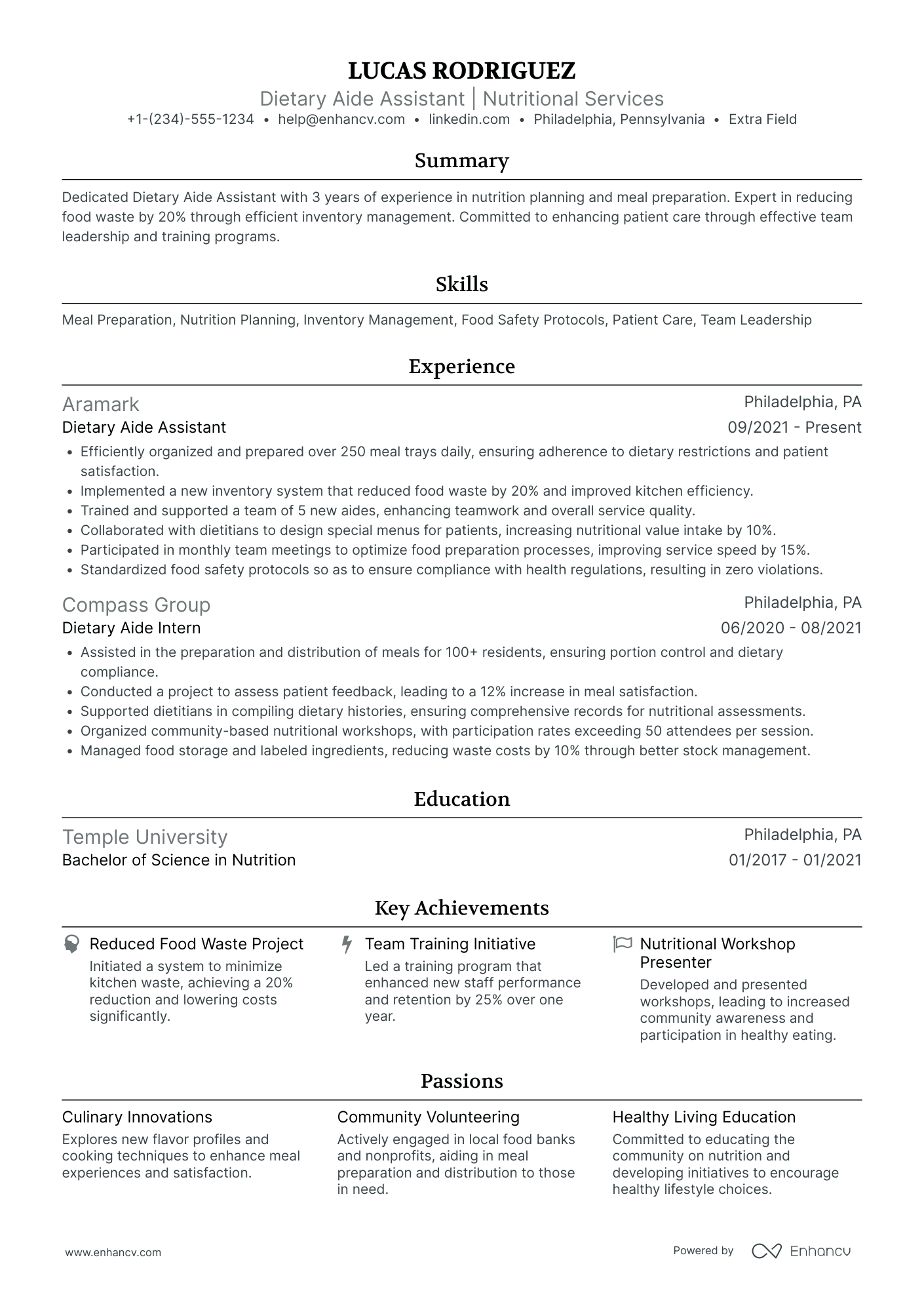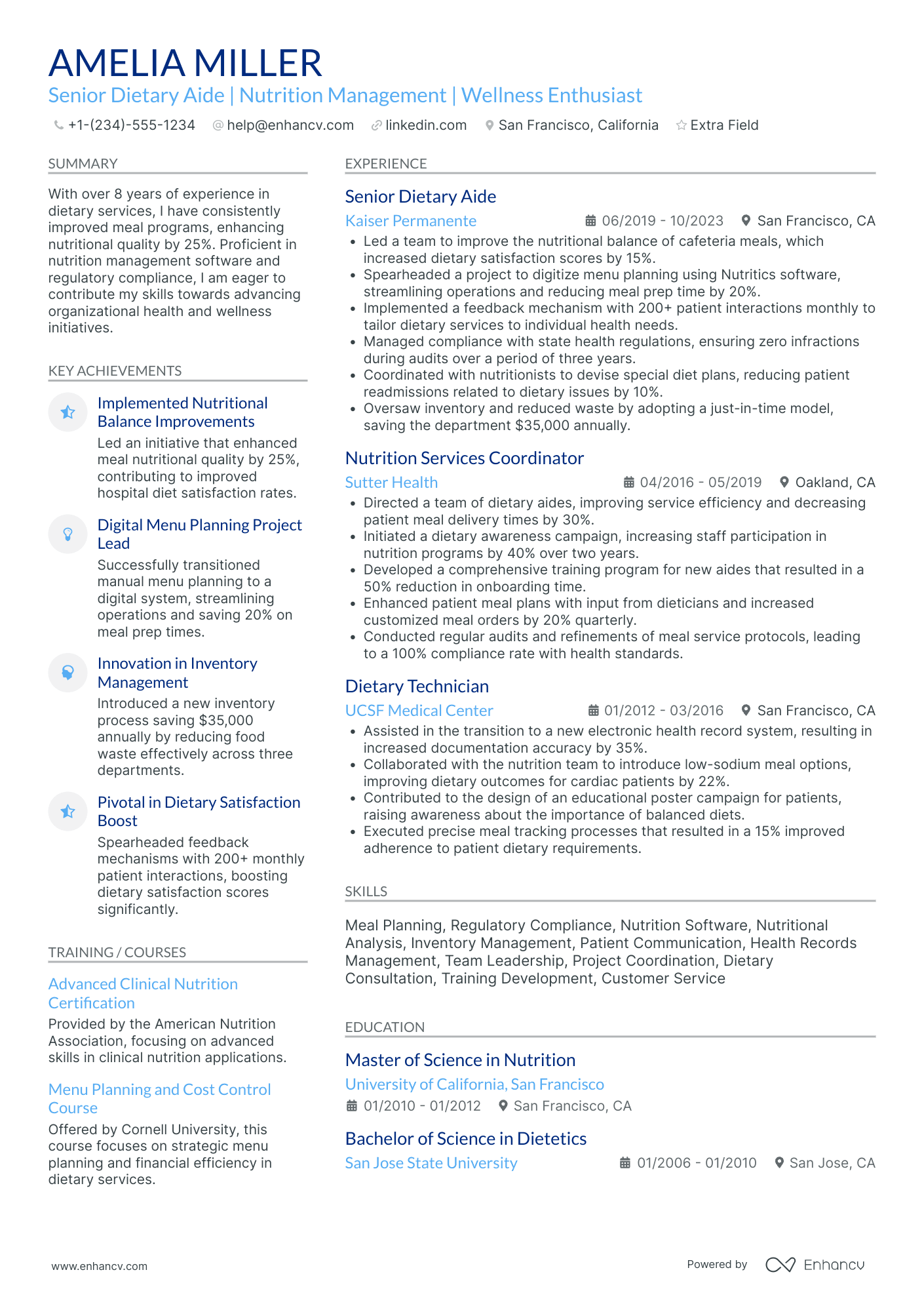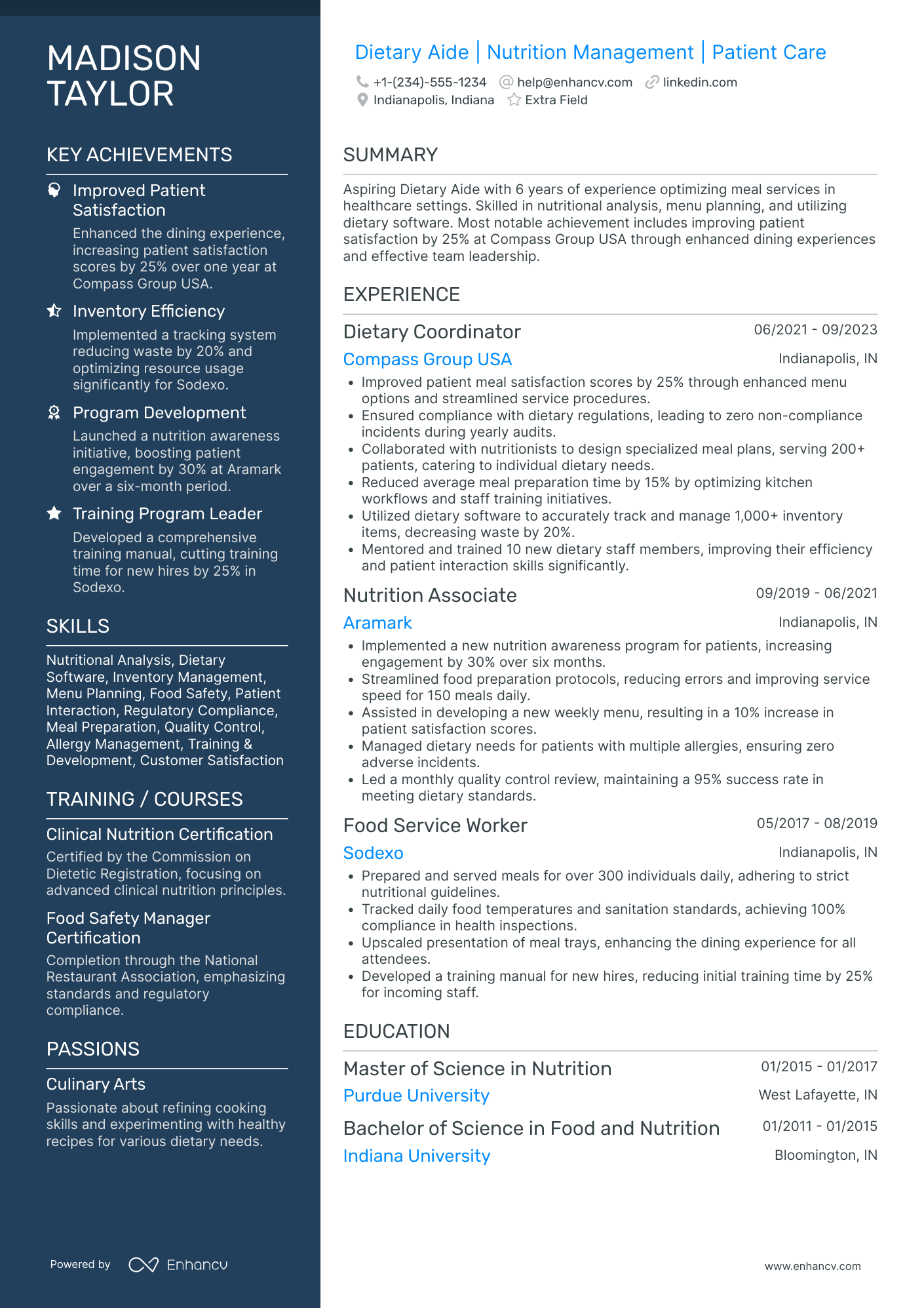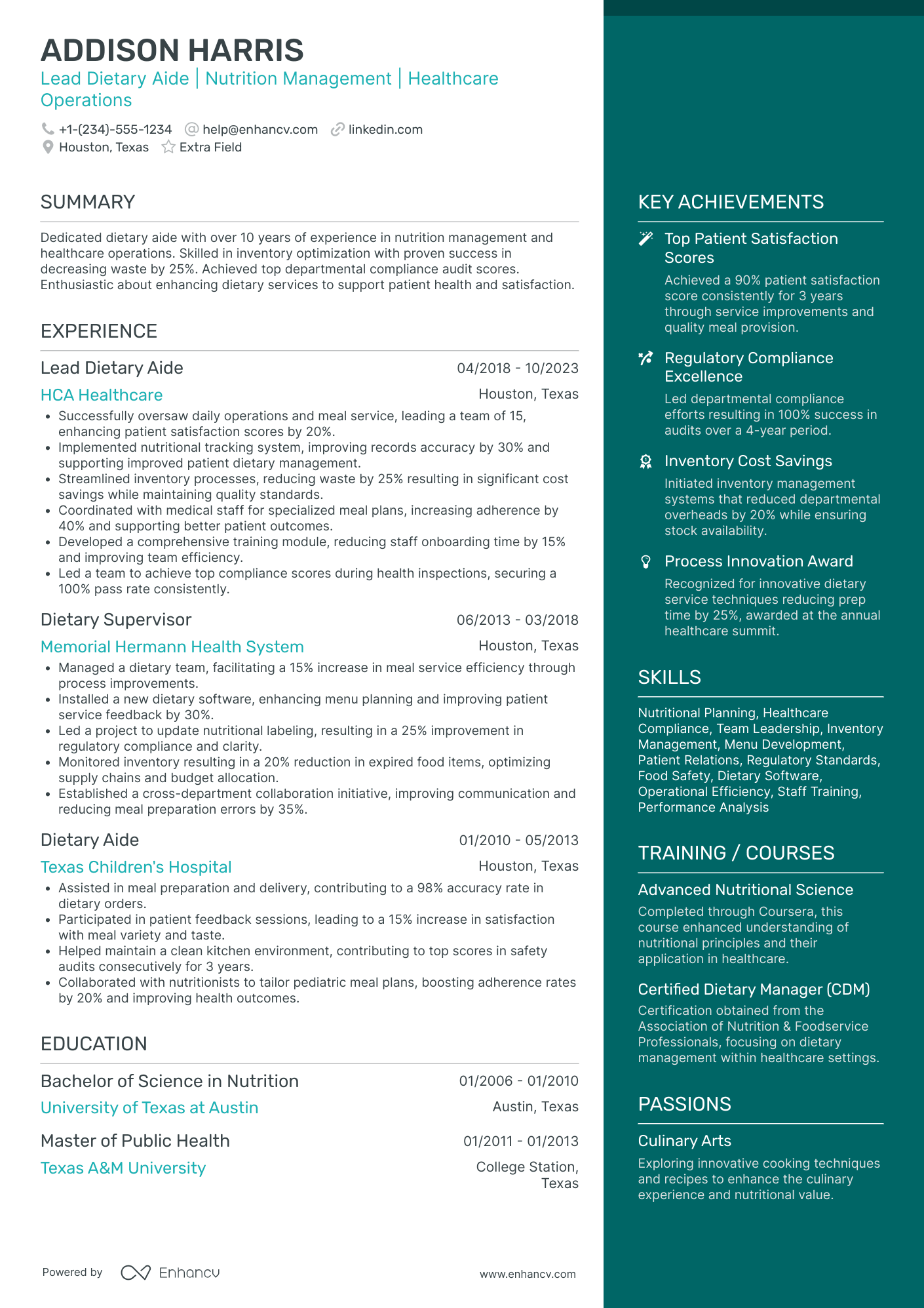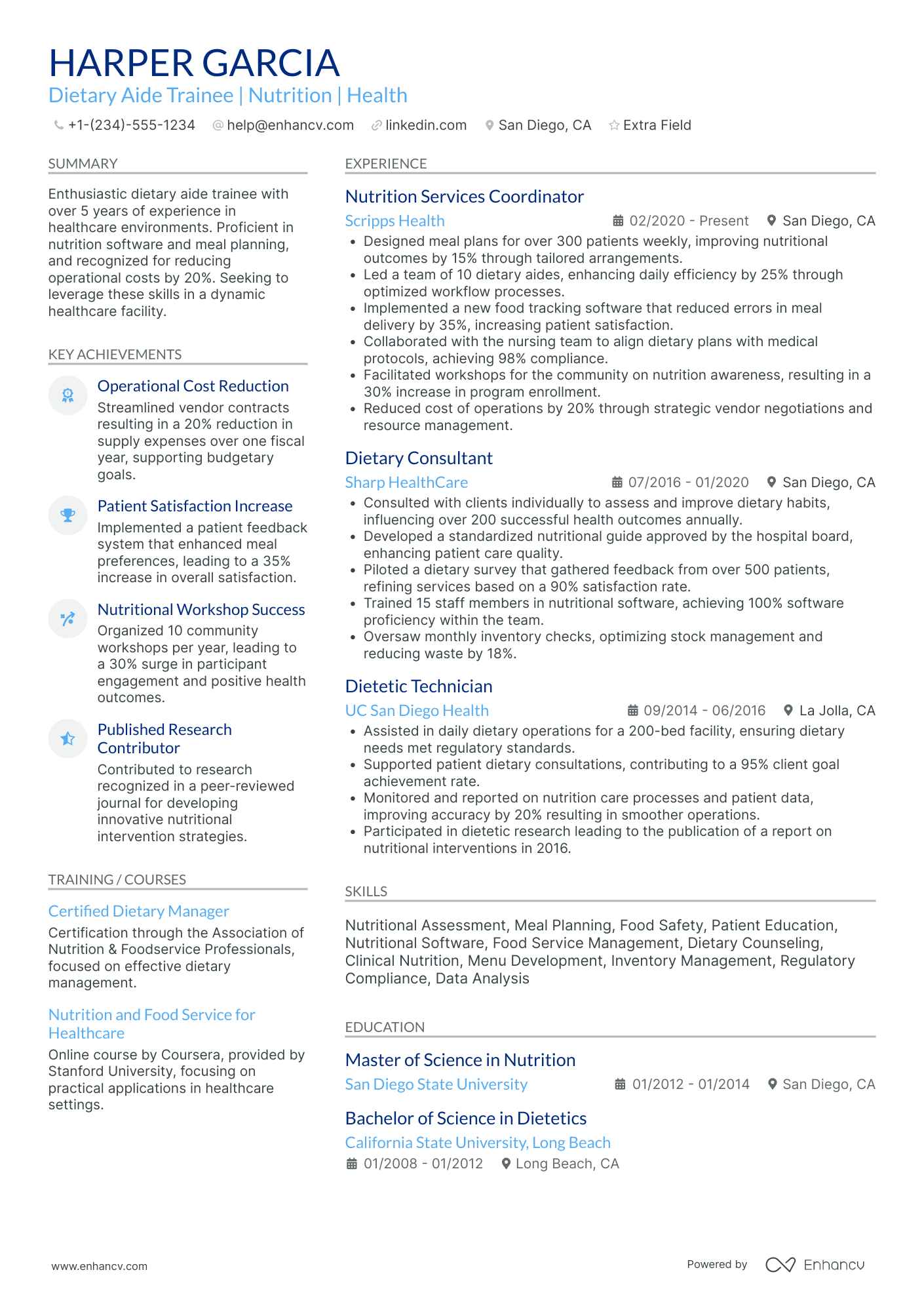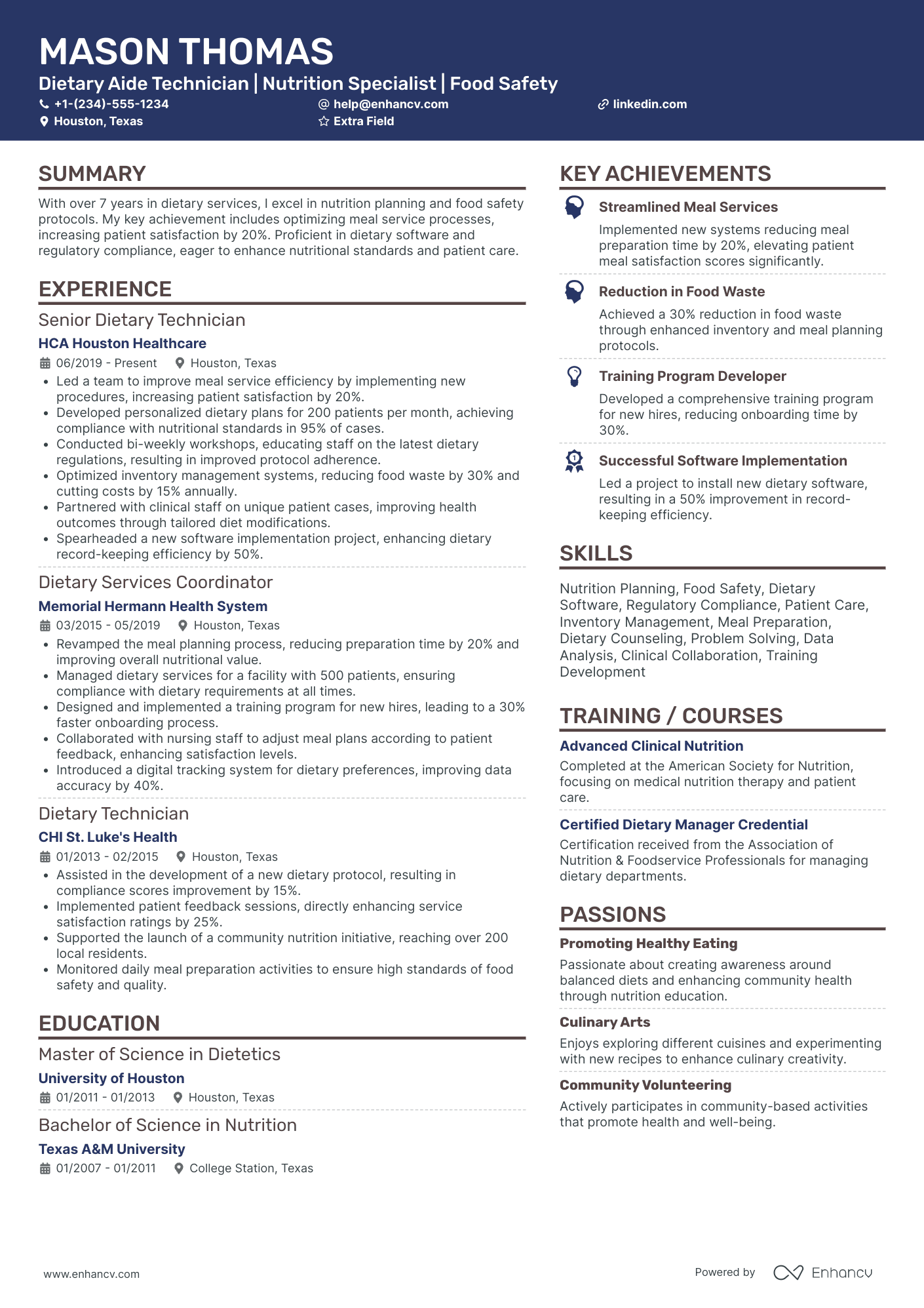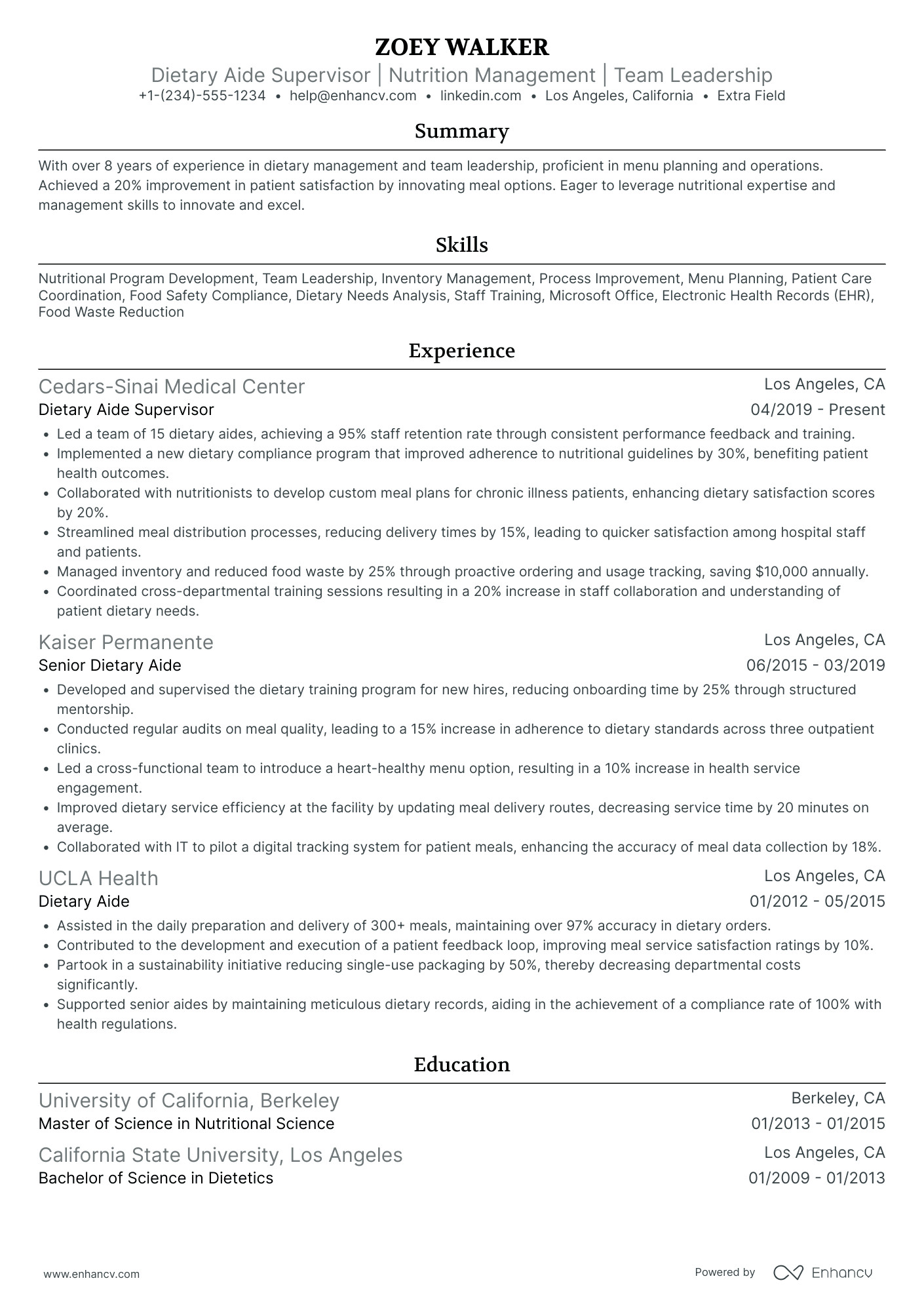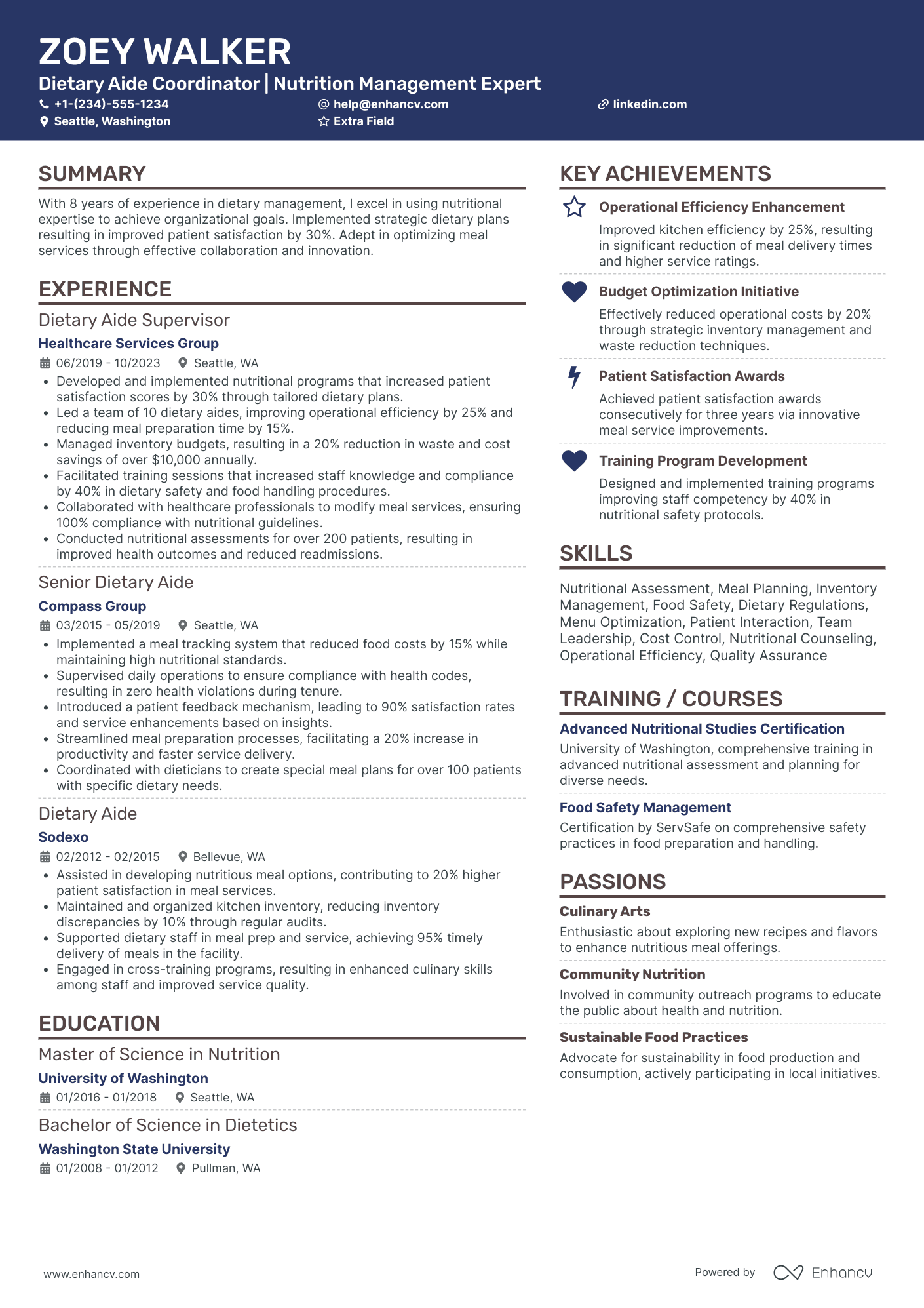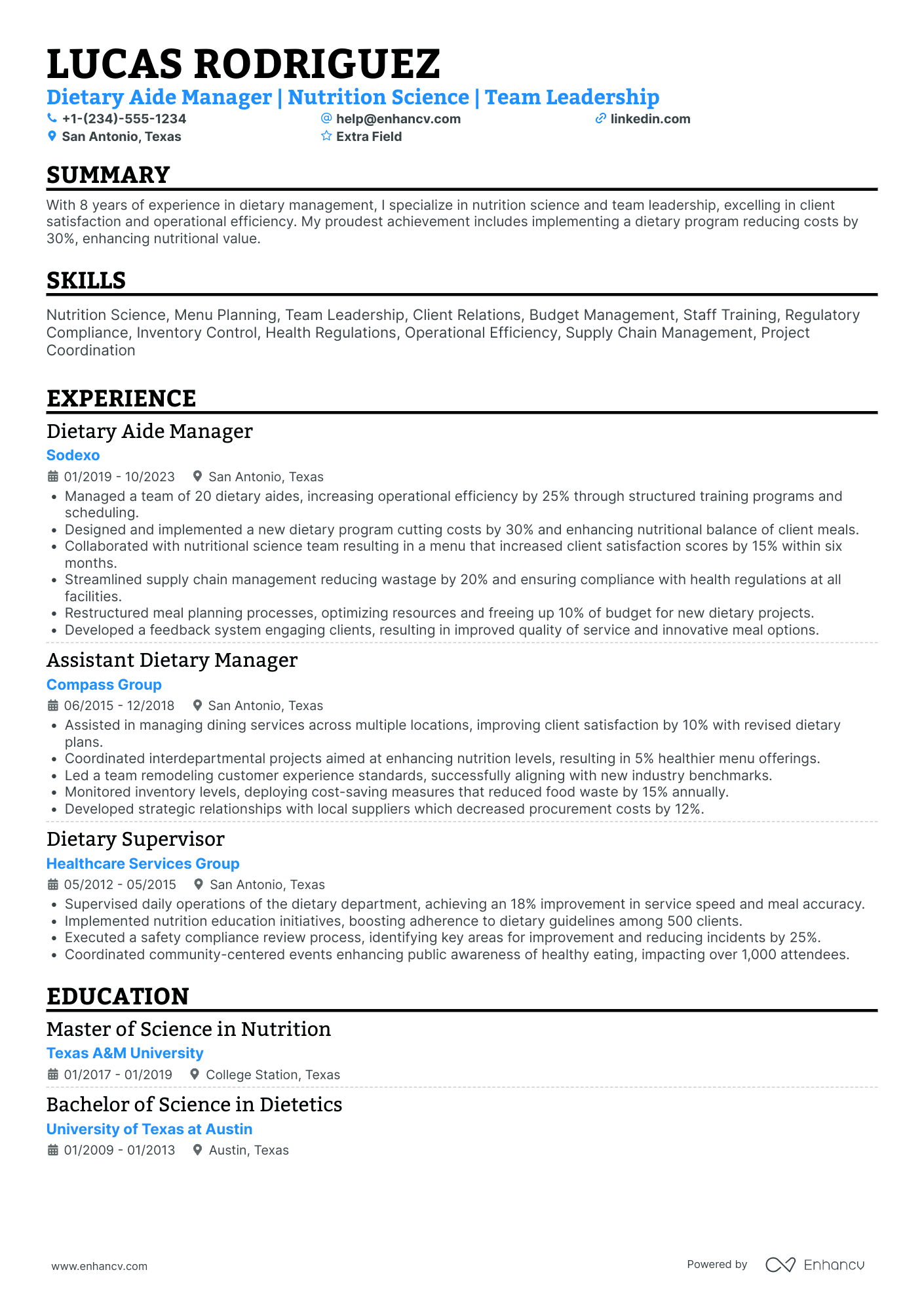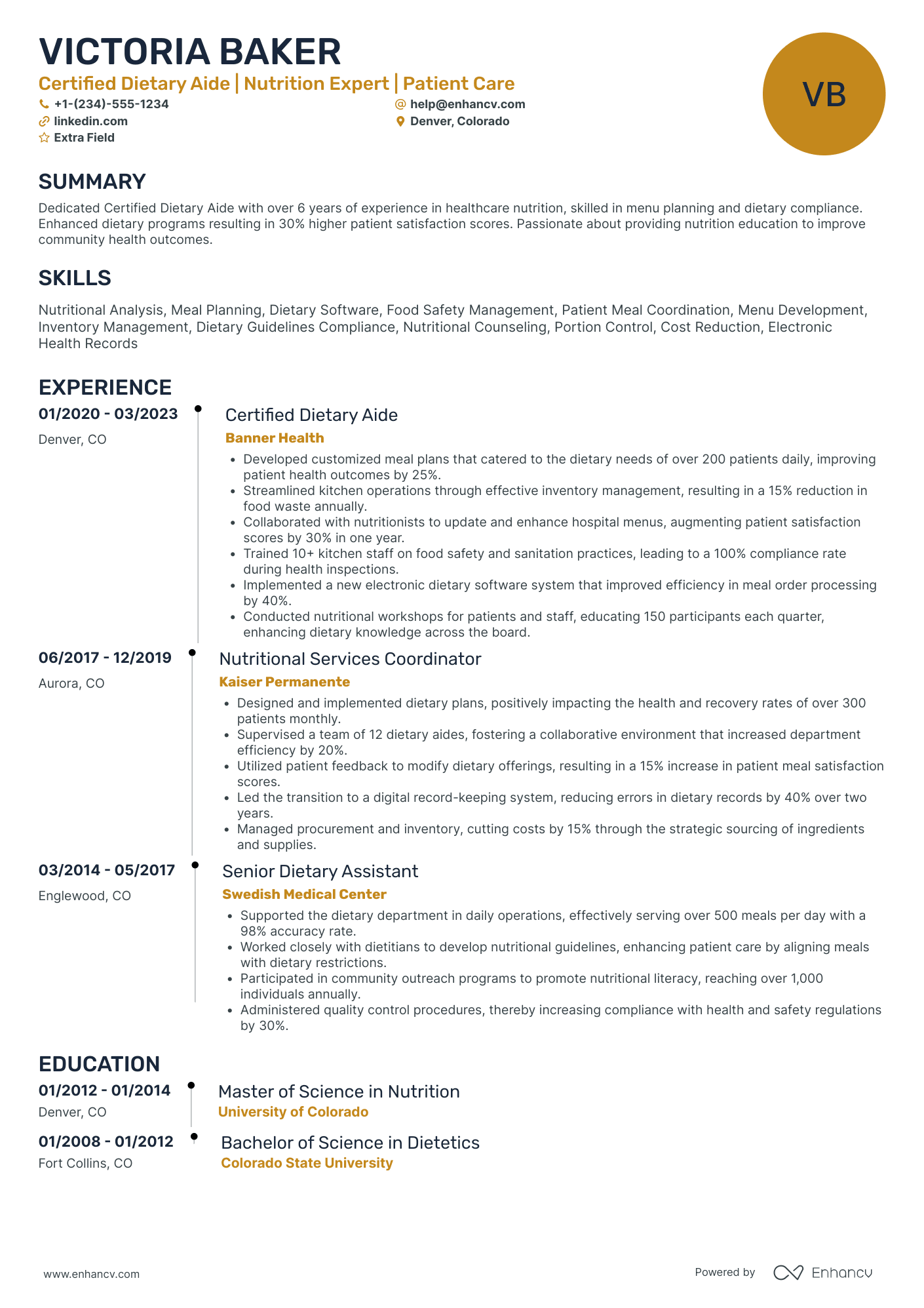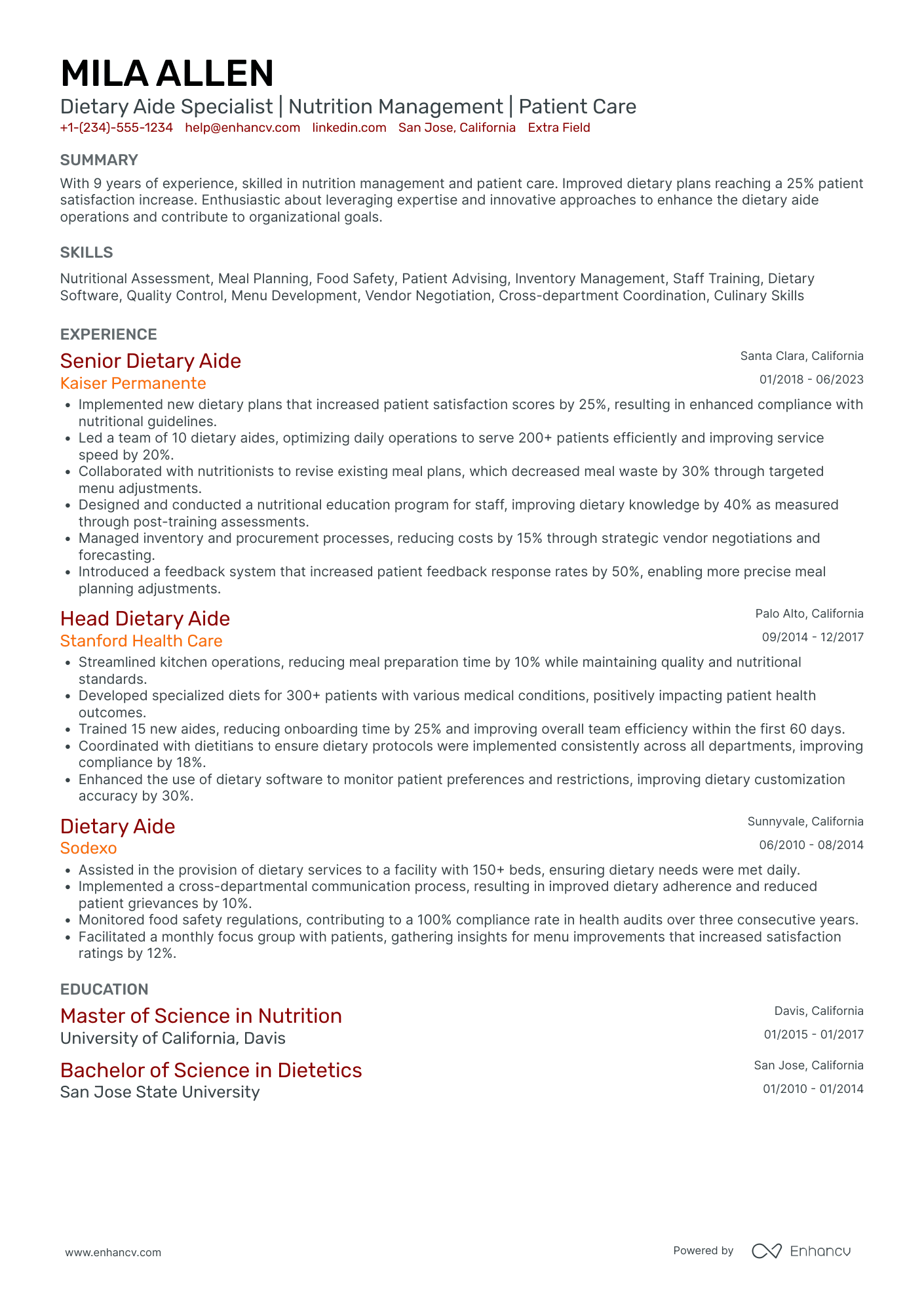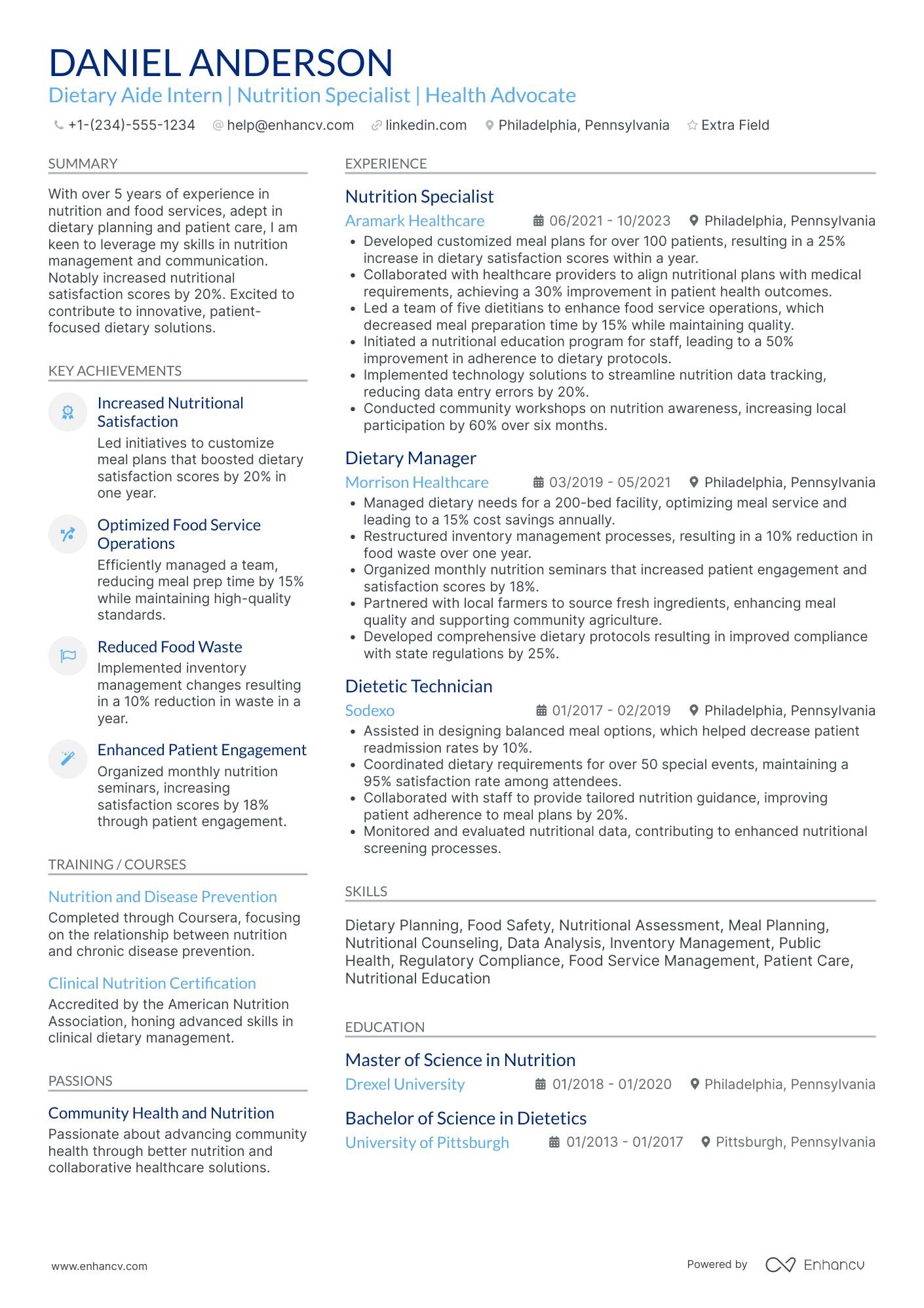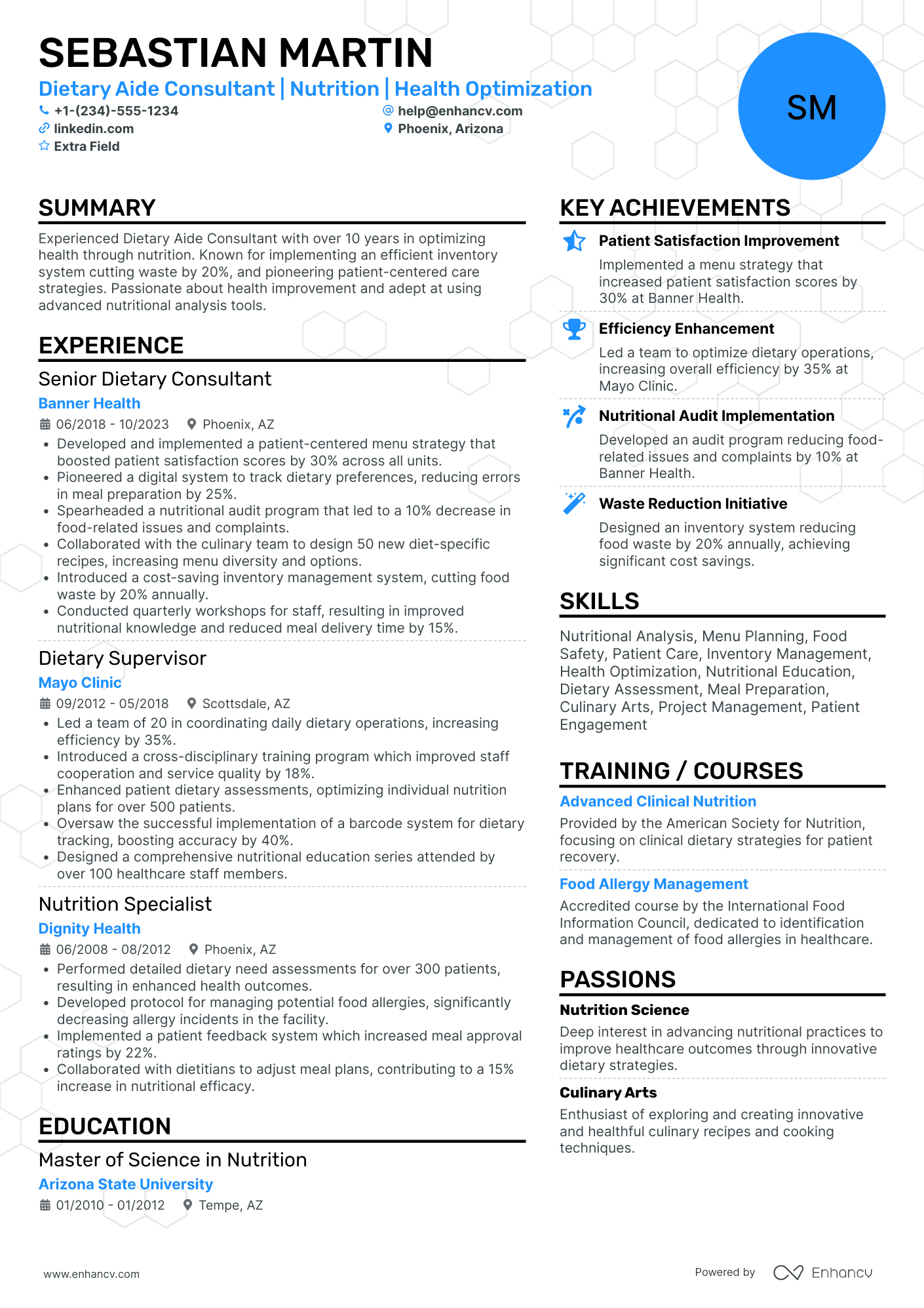As a dietary aide, you might struggle with effectively showcasing your specialized knowledge and hands-on experience in nutrition and dietary needs on your resume. Our guide offers tailored strategies to highlight your unique qualifications, ensuring your resume stands out to potential employers in healthcare and food service settings.
- The most straightforward and effective resume format, ensuring your dietary aide resume stands out among numerous candidate profiles;
- The significance of the top one-third of your resume, including the header, summary or objective, and skills section, and its impact on recruiters;
- Frameworks and structures used by real dietary aide professionals, offering insights on how to enhance your resume with industry-specific expertise;
- A variety of dietary aide resume sections that bolster your profile, showcasing your comprehensive capabilities and distinctiveness.
Gaining insights from the best has never been easier. Explore more dietary aide resume examples below:
- Medical Surgical Nurse Resume Example
- Nurse Educator Resume Example
- Pediatric Nurse Resume Example
- Clinical Nurse Resume Example
- Critical Care Nurse Resume Example
- Nicu Nurse Resume Example
- Nursing Student Resume Example
- Clinical Nurse Manager Resume Example
- Healthcare Resume Example
- ER Nurse Resume Example
Don't stress out over your dietary aide resume format
Remember, the elaborate design of your dietary aide resume isn't what impresses recruiters most. They are primarily searching for candidates who meet the job requirements. The main aim of your resume should be to clearly and concisely explain why employers should hire you.
Here are four straightforward steps to consider in your dietary aide resume design:
- Organize your resume based on experience: Start with your most recent roles. Besides using reverse chronological order, choose jobs relevant to the position you're applying for.
- Include your contact details (and portfolio or LinkedIn link) in your resume's header to ensure recruiters can easily reach you. If considering adding a professional photo, check acceptable practices in different countries first.
- Don't omit essential dietary aide resume sections such as the summary or objective, experience, and education. These sections should reflect your career progression and align with job requirements.
- Maintain conciseness in your resume. For those with less than ten years of experience, a one-page format is advisable.
Regarding the format to submit your dietary aide resume, PDF is preferable. PDFs are more likely to maintain their formatting when processed through recruitment software or ATS, saving you time in the application process.
When selecting a font for your dietary aide resume, consider the following:
- Choose ATS-friendly fonts such as Exo 2, Volkhov, Lato, etc., to keep your resume's content legible;
- All serif and sans-serif fonts are easily readable by ATS;
- While Arial and Times New Roman are common choices, opting for unique typography can help your resume stand out.
Concerned about ATS compatibility with charts and infographics? Our recent study has debunked this and other myths.
Remember, resume layouts can vary by country – for example, a Canadian resume format could look different.
Upload & Check Your Resume
Drop your resume here or choose a file. PDF & DOCX only. Max 2MB file size.
PRO TIP
Listing your relevant degrees or certificates on your dietary aide resume is a win-win situation. Not only does it hint at your technical capabilities in the industry, but an array of soft skills, like perseverance, adaptability, and motivation.
Fundamental sections for your dietary aide resume:
- The header with your name (if your degree or certification is impressive, you can add the title as a follow up to your name), contact details, portfolio link, and headline
- The summary or objective aligning your career and resume achievements with the role
- The experience section to curate neatly organized bullets with your tangible at-work-success
- Skills listed through various sections of your resume and within an exclusive sidebar
- The education and certifications for more credibility and industry-wide expertise
What recruiters want to see on your resume:
- Experience with food preparation and safety protocols specific to dietary needs.
- Familiarity with healthcare dietary requirements, including knowledge of therapeutic diets and allergen management.
- Proven record of maintaining cleanliness and hygiene standards in a kitchen or food service setting.
- Exceptional interpersonal and communication skills for effectively interacting with patients, staff, and dietitians.
- Time management and organizational skills to efficiently manage meal preparation and distribution.
Defining your professional expertise in your dietary aide resume work experience section
The work experience section, often the most detailed part of your resume, is where you discuss your past roles and achievements. To effectively list your experience, consider these four key tips:
- Align your expertise with the job requirements. It's vital to integrate keywords matching the job criteria to pass initial assessments;
- Show, don’t just tell. Quantify your responsibilities by stating your actual achievements in previous roles;
- Include measurable metrics. For instance, how did your performance impact the annual ROI?
- Highlight crucial industry skills. Mention both technological knowledge and interpersonal skills in this section.
These guidelines will help you craft an impressive dietary aide resume work experience section that is bound to catch recruiters' attention.
- Assisted in meal preparation for over 150 residents daily at a premier assisted living facility, adhering to varied dietary restrictions and preferences.
- Conducted inventory tracking and management, reducing food waste by 25% over a two-year period through effective portion control and procurement strategies.
- Implemented a new patient food feedback system, collaborating with a nutritionist to adjust menus and enhance meal satisfaction rates by 30%.
- Spearheaded a cross-functional task force to redesign the dietary program, increasing patient adherence to prescribed diets by 20%.
- Managed the coordination and safe transportation of meals to various units within a 200-bed hospital, ensuring strict adherence to proper food handling protocols.
- Initiated a training module on culturally diverse cuisine that enhanced the culinary team’s ability to prepare a wider variety of ethnic-specific diets.
- Collaborated with the dietician to create and deliver personalized meal plans, leading to improved patient satisfaction for 120+ residents.
- Developed a system to ensure the timely delivery of meals for special events, which was later adopted hospital-wide, showcasing organizational and time management skills.
- Liaised with kitchen staff to monitor inventory levels, assisted in ordering supplies, and reduced overstock by 15%.
- Utilize medical software to receive and process dietary requirements for over 180 patients, showing proficiency in technological solutions.
- Led the initiative to digitize the meal tracking process, resulting in a 40% reduction in paperwork and streamlined operations.
- Championed a weekly healthy eating workshop for residents, which has been integral in enhancing their understanding of nutrition and well-being.
- Orchestrated the transition to a farm-to-table program in collaboration with local farmers, boosting the freshness of ingredients used in meal preparations.
- Managed the special diets section, preparing up to 80 individualized meals per day that catered to patients with strict dietary needs.
- Played a pivotal role in the dietary department's compliance with food safety standards, achieving a 99% rating during yearly health inspections.
- Conducted nutritional analysis and meal adjustments under the guidance of a certified dietician to better align with patients' health goals.
- Trained over 20 new dietary staff members, fostering a team atmosphere and ensuring a high standard of service delivery.
- Engaged with patients to gather meal satisfaction data, leading to a tailored diet plan that saw a 10% increase in patient meal compliance.
- Efficiently prepared dietary-specific trays for approximately 100+ residents per shift with a focus on accuracy, presentation, and temperature control.
- Implemented and maintained a kitchen sanitation schedule, which significantly reduced the number of reported foodborne incidents.
- Facilitated a monthly meeting with residents to discuss and plan menus, incorporating their feedback to enhance their dining experience.
- Optimized the inventory management system using latest software, leading to a reduction in food spoilage costs by over $10,000 annually.
- Established a patient-nutrition liaison program to personalize and improve meal satisfaction for a diverse patient population.
- Led a successful initiative to obtain grant funding for a sustainable organic garden, which supplies the facility with fresh produce year-round.
Quantifying impact on your resume
- Include the number of meals prepared and served daily to showcase efficiency and productivity.
- List any percentages of waste reduction achieved through effective inventory management to demonstrate cost-saving abilities.
- Highlight the number of specialized diets you have managed to show expertise in dietary requirements and customization.
- Quantify improvements in patient satisfaction scores if involved in collecting and responding to feedback.
- Mention the volume of supplies ordered and managed to emphasize organizational and planning skills.
- Document the number of kitchen staff trained or supervised to illustrate leadership and training capabilities.
- Detail the number of dietary plans developed to demonstrate knowledge and innovation in nutrition planning.
- State any reduction in meal preparation time as a result of process improvements to reflect efficiency and time management skills.
Action verbs for your dietary aide resume
No experience, no problem: writing your dietary aide resume
You're quite set on the dietary aide role of your dreams and think your application may add further value to your potential employers. Yet, you have no work experience . Here's how you can curate your resume to substitute your lack of experience:
- Don't list every single role you've had so far, but focus on ones that would align with the job you're applying for
- Include any valid experience in the field - whether it's at research or intern level
- Highlight the soft skills you'd bring about - those personality traits that have an added value to your application
- Focus on your education and certifications, if they make sense for the role.
Recommended reads:
PRO TIP
If you're in the process of obtaining your certificate or degree, list the expected date you're supposed to graduate or be certified.
Dietary aide skills and achievements section: must-have hard and soft skills
A key principle for your dietary aide resume is to prominently feature your hard skills, or the technologies you excel in, within the skills section. Aim to list several hard skills that are in line with the job's requirements.
When it comes to soft skills, like interpersonal communication abilities and talents, they're trickier to quantify.
Claiming to be a good communicator is one thing, but how can you substantiate this claim?
Consider creating a dedicated "Strengths" or "Achievements" section. Here, you can describe how specific soft skills (such as leadership, negotiation, problem-solving) have led to concrete achievements.
Your dietary aide resume should reflect a balanced combination of both hard and soft skills, just as job requirements often do.
Top skills for your dietary aide resume:
Food Safety Regulations
Nutrition Knowledge
Meal Preparation
Food Handling Techniques
Dietary Management Software
Inventory Management Systems
Cleaning and Sanitation Procedures
Portion Control
Dietary Guidelines
Kitchen Equipment Operation
Communication
Teamwork
Attention to Detail
Time Management
Empathy
Adaptability
Problem-Solving
Organization
Customer Service
Dependability
PRO TIP
Showcase any ongoing or recent educational efforts to stay updated in your field.
Discover the perfect certification and education to list on your dietary aide resume
Value the insights your resume education section offers. It can shed light on various proficiencies and experiences tailored for the job.
- Add only college or university degrees, stating the institution and duration.
- If you're nearing the end of your degree, note your graduation date.
- Weigh the pros and cons of including unrelated degrees - it might not be your best choice with so little space on your resume.
- Talk about your educational achievements if they amplify your relevant experience.
There are so many certificates you can list on your resume.
Just which ones should make the cut?
- List your prominent higher education degree in a separate box, alongside the name of the institute you've obtained it from and your graduation dates
- Curate only relevant certificates that support your expertise, hard skills, and soft skills
- Certificates that are more niche (and rare) within the industry could be listed closer to the top. Also, this space could be dedicated to more recent certifications you've attained
- Add a description to your certificates or education, only if you deem this could further enhance your chances of showcasing your unique skill set
When listing your certificates, remember that it isn't a case of "the more, the merrier", but rather "the more applicable they are to the industry, the better".
Recruiters have hinted that these are some of the most in-demand certificates for dietary aide roles across the industry:
The top 5 certifications for your dietary aide resume:
- ServSafe Food Handler Certification (ServSafe) - National Restaurant Association
- Dietary Manager Certification (CDM) - Association of Nutrition & Foodservice Professionals
- Food Service Worker Certificate (FSWC) - Various community colleges and vocational schools
- Certified Dietary Manager, Certified Food Protection Professional (CDM, CFPP) - Credentialing Exam by the Certifying Board for Dietary Managers
- Nutrition and Foodservice Professional Training (NFPT) - University of North Dakota
PRO TIP
If you happen to have plenty of certificates, select the ones that are most applicable and sought-after across the industry. Organize them by relevance to the role you're applying for.
Recommended reads:
Which one to use: a resume summary or a resume objective?
The dietary aide resume summary or objective serves as a good introduction to your experience for recruiters.
Have you ever wondered which one (the summary or objective) will be more appropriate for your dietary aide resume?
- If you are a less experienced professional, write a resume objective statement. The objective is about three sentences long and provides recruiters with information about your career goals, strengths, and achievements . It should basically denote how you see yourself in this particular role, and what is your relevant experience and/or know-how;
- If you happen to have plenty of relevant experience, select your most impressive achievements for your resume summary. The summary is no longer than five sentences and serves as a storytelling instrument - highlighting your greatest career wins . Don't forget to align your summary with the job requirements to ensure your resume stays relevant to the role.
Read on for more information and examples of resume summaries and objectives from real world professionals.
Resume summaries for a dietary aide job
- With over 5 years of dedicated experience in nutritional services at a high-end retirement community, I have honed the skills necessary for specialized dietary planning and efficient kitchen operations. Awarded Employee of the Month for implementing a waste-reduction program that saved 20% in costs, I bring a blend of expertise and passion for health and wellness to every meal prepared.
- Seasoned chef with 10 years at a Michelin-starred restaurant, I am transitioning to a dietary aide role to focus on nutrition and healthful eating. Renowned for crafting exquisite menus and attention to detail, I aim to merge culinary finesse with dietary considerations, having already gained a certificate in nutrition since my career redirection.
- As a former educator with a Master's degree in Public Health, my shift to dietary aide is driven by a commitment to community wellness. No direct experience in dietary roles, but my 8-year teaching career has equipped me with exceptional communication skills, planning abilities, and a talent for promoting healthy lifestyle choices to diverse populations.
- Accomplished in customer service with 3 years of experience in the hospitality industry, my transition to a dietary aide reflects a desire to combine my people skills with a newfound passion for nutrition. Currently enrolled in a dietary assistant program, I am eager to apply my learning and interact with clients to support their dietary needs.
- Aspiring to enter the field of dietary service, my objective is to contribute to an environment that prioritizes health and well-being. Though currently lacking direct experience, I bring a fresh perspective, a rigorous work ethic fostered during a 2-year internship in a fast-paced non-profit, and a foundational knowledge of nutritional principles garnered from an ongoing health sciences degree.
- Eager to begin a career as a dietary aide, my objective is to leverage my personable nature and background in volunteer food service to ensure high-quality dietary care. My no prior professional experience in dietary roles is balanced by a strong foundation in volunteer meal prep and a genuine enthusiasm for supporting individuals to meet their personal nutritional goals.
Extra sections to include in your dietary aide resume
What should you do if you happen to have some space left on your resume, and want to highlight other aspects of your profile that you deem are relevant to the role? Add to your dietary aide resume some of these personal and professional sections:
- Passions/Interests - to detail how you spend both your personal and professional time, invested in various hobbies;
- Awards - to present those niche accolades that make your experience unique;
- Publications - an excellent choice for professionals, who have just graduated from university or are used to a more academic setting;
- Volunteering - your footprint within your local (or national/international) community.
Key takeaways
Securing your ideal job starts with crafting a compelling dietary aide resume. It should not only highlight your professional strengths but also reflect your personality. Key aspects to remember include:
- Choose a clear, easily editable format, allowing more time to focus on the content of your resume;
- Emphasize experience relevant to the job, focusing on your impact on the team;
- Opt for a resume summary if you have extensive professional experience, and a resume objective if you're just starting out;
- Include technical skills in the skills section and interpersonal skills in the achievements section;
- Recognize the importance of various resume sections (e.g., My Time, Projects) in showcasing both your professional abilities and personal traits.
Dietary Aide resume examples
By Experience
Dietary Aide Assistant
Senior Dietary Aide
Entry-Level Dietary Aide
Lead Dietary Aide
Dietary Aide Trainee
By Role
